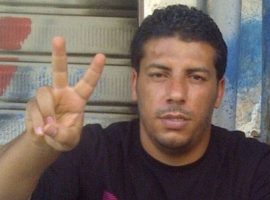This article is sourced from Americans for Democracy and Human Rights in Bahrain (ADHRB), one of the European Centre for Democracy and Human Rights’ sister organisations
Majeed Ahmed Habib Ahmed is a 37-year-old Bahraini citizen who was arrested in 2013. Bahraini authorities arrested him at his home without a warrant for allegedly attending a protest, and he was subjected to torture and convicted in an unfair trial. He is now being held at Jau Prison.
On 7 May 2013, at 4:00am, officers in plain clothing raided Majeed’s house and arrested him. When asked about the reason for arrest, one of the officers said that Majeed attended a protest the day before; however Majeed maintains that he spent the day at home. Majeed was told he would be taken to the Criminal Investigations Directorate (CID), and that they would return him within two days. However, the officers disappeared Majeed and held him incommunicado for 15 days following his arrest.
During his detention at the CID, officers subjected Majeed to severe psychological and physical torture. They blindfolded him, hit him, deprived him of praying and taking showers, and forced him to stand for long periods of time. They also stripped Majeed of his clothes and forced him to dance and chant “Long Live Bu Salman,” in reference to the royal family. In addition, they threatened to sexually assault his wife. They also forced him to wear wet clothes and held him in an extremely cold room with the air conditioner on high for three days. His lawyer was not allowed to be present for the entire period of investigation. After being tortured, Majeed signed a prepared confession. On 21 May 2013, 15 days after his arrest, Majeed was transferred to Dry Dock Detention Center.
Majeed was sentenced to six months’ imprisonment for participating in an illegal assembly. On 17 July 2014, he was sentenced to an additional 15 years’ imprisonment on the charges of joining a terrorist group and the attempted murder of a police officer. After his conviction, he was transferred to Jau Prison, here he currently remains. His conviction was upheld on appeal, and again by the Court of Cassation in September 2016. As such, he has now exhausted all domestic remedies.
Majeed has been subjected to poor conditions and medical neglect while imprisoned. At Jau Prison, the administration held Majeed in solitary confinement in April 2019, and deprived him of medical treatment, although he suffered bleeding from his eyes and ears and reported back, shoulder, and foot pain.
Bahrain’s actions against Majeed violate international law, including the Convention Against Torture and Other Cruel, Inhuman or Degrading Treatment or Punishment (CAT), the International Covenant on Civil and Political Rights (ICCPR), and the International Covenant on Economic, Social, and Cultural Rights (ICESCR), to each of which Bahrain has acceded. Articles 2 and 11 of the CAT prohibit torture and ill treatment and require State Parties to prevent torture as well as to investigate and punish its perpetrators. Furthermore, Majeed’s arrest and detention without a warrant infringed on his right to liberty and security, protected under Article 9 of the ICCPR. Majeed’s conviction, in light of his coerced confession obtained through torture, was the product of an unfair trial per Article 14 of the ICCPR, which entitles everyone to a fair and public hearing by a competent, independent, and impartial tribunal, and Article 15 of CAT, which ensures that any statement established as a result of torture be revoked as evidence in any proceedings. Additionally, Article 12 of the ICESCR enumerates the right to health, under which the Bahraini authorities are required to provide for Majeed’s medical care.
The European Centre for Democracy and Human Rights (ECDHR) joins Americans for Democracy & Human Rights in Bahrain (ADHRB) in calling for the immediate release of Majeed, in light of his unfair trial. In addition, we call for an investigation into his allegations of torture and ill-treatment. We further call for the authorities to provide Majeed with compensation for his arbitrary detention and suffering. Prison authorities must provide immediate and regular medical care to all prisoners and detainees.

